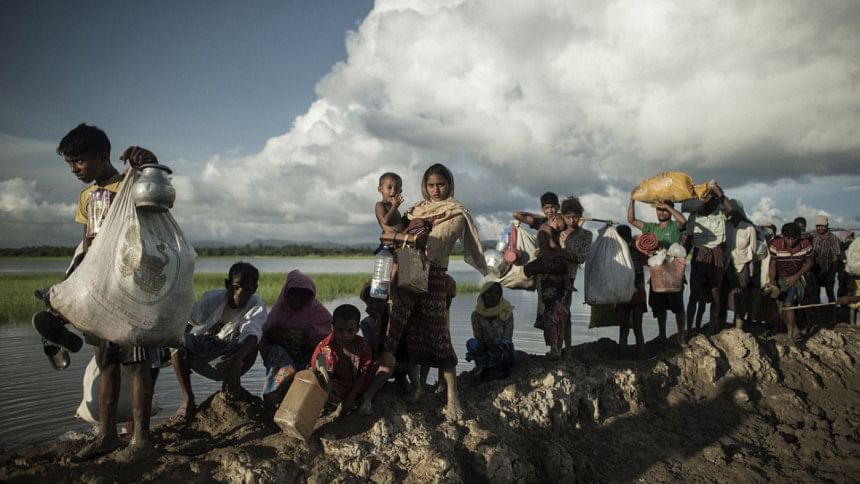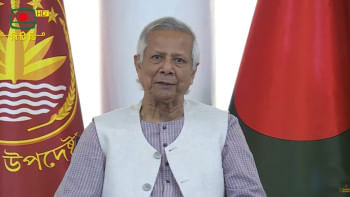Can UN make a difference?

The resolution passed by UN General Assembly on Sunday asking Myanmar to end a military campaign against Rohingyas and ensure the return of all refugees and grant full citizenship rights to them offered afresh some flowery words for the world's most persecuted community. But it holds little hope for them as the resolution does not have any legal effect. Therefore Myanmar has no obligation to abide by it and may remain unchanged in its strategy as in the past.
The UNGA, in around the last three decades, has passed more than two dozen resolutions asking Myanmar to stop human rights abuses and take steps against the perpetrators of rights violations. The records show that every year since 1991 the UNGA in its resolutions has expressed concern at the grave human rights situation in Myanmar and urged the authorities to take measures to improve the conditions. In addition, according to a Reuters report on November 16, the General Assembly's Third Committee, which focuses on human rights, has annually adopted a resolution condemning Myanmar's human rights record for the last 15 years. But all efforts by the UN have gone nowhere. The Myanmar government has continued to persecute its ethnic minorities.
Atrocities by Myanmar military against Rohingyas since last August, which forced nearly 670,000 Rohingyas fleeing violence to enter Bangladesh, are the latest example of how Myanmar authorities have been ignoring UN calls for decades.
The UN itself labelled the atrocities against Rohingyas a "textbook example of ethnic cleansing" and international rights bodies and rights leaders have termed it "genocide". The UN Commission on Human Rights prepared numerous reports over the years detailing the grave situation of human rights in Myanmar. The UN on several occasions called upon the Myanmar military to end violence against Rohingyas. But nothing worked due to Myanmar's disregard to UN efforts.
Take the examples of some resolutions passed by the UNGA over the years since 1991 calling upon Myanmar to improve the human rights situation and bring the perpetrators to justice. The UNGA on December 17, 1991 in a resolution stressed the need for early improvement of the state of human rights in the country.
In March 1995, the UNGA urged the government of Myanmar to ensure full respect for human rights and fundamental freedoms, including freedom of expression and assembly, and the protection of the rights of persons belonging to ethnic and religious minorities.
It also urged to put an end to violations of the right to life and integrity of the human being, to the practices of torture, abuse of women, forced labour and forced relocations, and to enforced disappearances and summary executions.
The UNGA in March 2007 called upon the government for taking actions to end impunity by bringing to justice any perpetrators of human rights violations, including members of the military and other government agents.
The UN also asked the Myanmar government to facilitate a genuinely independent investigation into continuing reports of sexual violence, in particular against women belonging to ethnic nationalities, and abuse of civilians carried out by members of the armed forces in Shan, Karen, Mon and other states.
In April 2013, the global body expressed its serious concern at the outbreak of violence between communities in Rakhine State in 2012 and called upon the Myanmar government to take all necessary actions to protect civilians without delay and to ensure a full, transparent and independent investigation to bring to justice those responsible.
The Myanmar government has never proceeded in line with the calls made by the UNGA over the decades. Rather it has continued to deny all allegations of atrocities against ethnic communities including Rohingyas, allowing perpetrators of alleged genocide against Rohingyas to enjoy impunity. It also denied a UN fact-finding commission entry into Myanmar this year. And recently, it banned UN special rapporteur for human rights in Myanmar, Yanghee Lee, for raising her voice against rights abuses.
The Myanmar military has merrily been disregarding UN efforts as the global body is unable to take any punitive action against them without consent of the UN Security Council. And it is almost impossible for the Security Council to pass a resolution against Myanmar due to strong opposition of China, a close aide of Myanmar for decades thanks to its strong economic and geo-political interests in Myanmar.
Backed by Russia, China has foiled several efforts by the Security Council to censure the Myanmar government by using its veto power. China, Russia and some countries strongly opposed Sunday's UNGA resolution moved by the OIC. China has been vehemently opposing any international efforts to resolve the Rohingya crisis.
Amid such a situation, the process for repatriation of Rohingyas who have crossed the border into Bangladesh since late August may start next month following a deal signed between Bangladesh and Myanmar. International rights bodies have observed that the atmosphere is not conducive to repatriation in the absence of any move to bring the perpetrators of genocide of Rohingyas to book.
Therefore, the crucial question is: Will Rohingyas be able to live in safety even if they are allowed to return to their homes by fulfilling a set of stringent criteria stipulated in the deal?
What Dag Hammarskjöld, the second UN secretary-general, said about the purpose of creating the UN in the first place should be recalled for UN's current chief Antonio Guterres to decide the next course of action. Dag Hammarskjöld said: "The United Nations was created not to lead mankind to heaven but to save humanity from hell."
All evidence testifies to a hell-like situation in Myanmar for Rohingyas and some other ethnic communities. What the UN has been doing for decades has not changed their fate. And sadly, its current role in resolving the Rohingya crisis does not give us much reassurance.
Shakhawat Liton is Special Correspondent at The Daily Star.










Comments